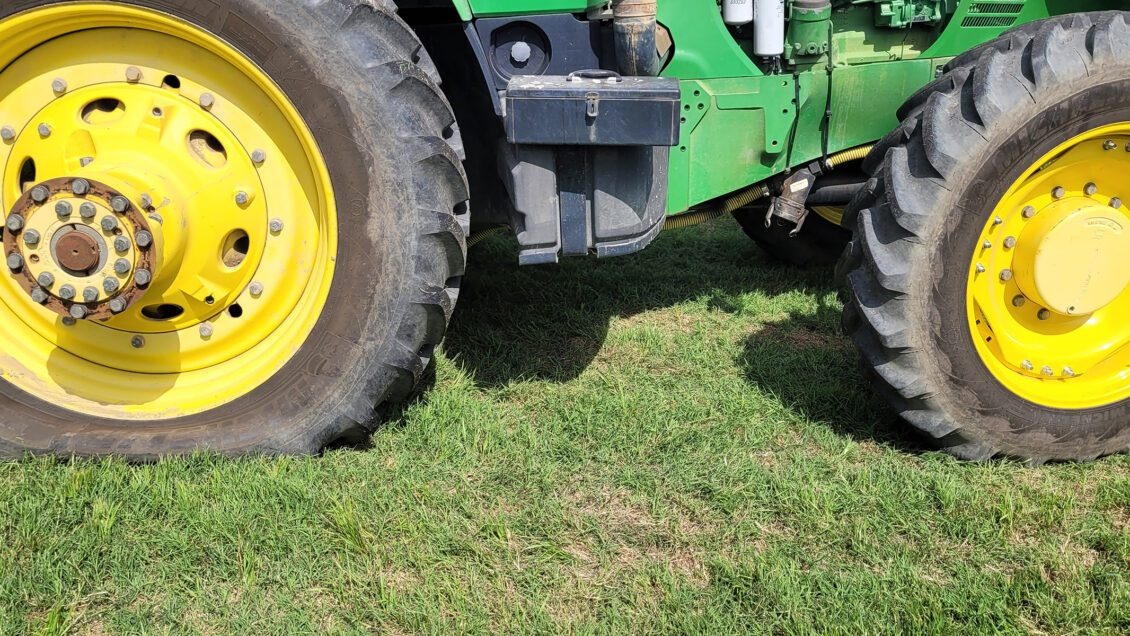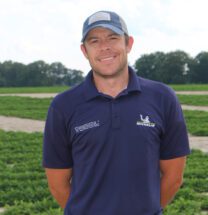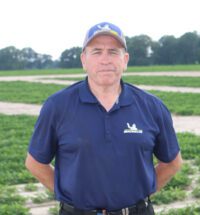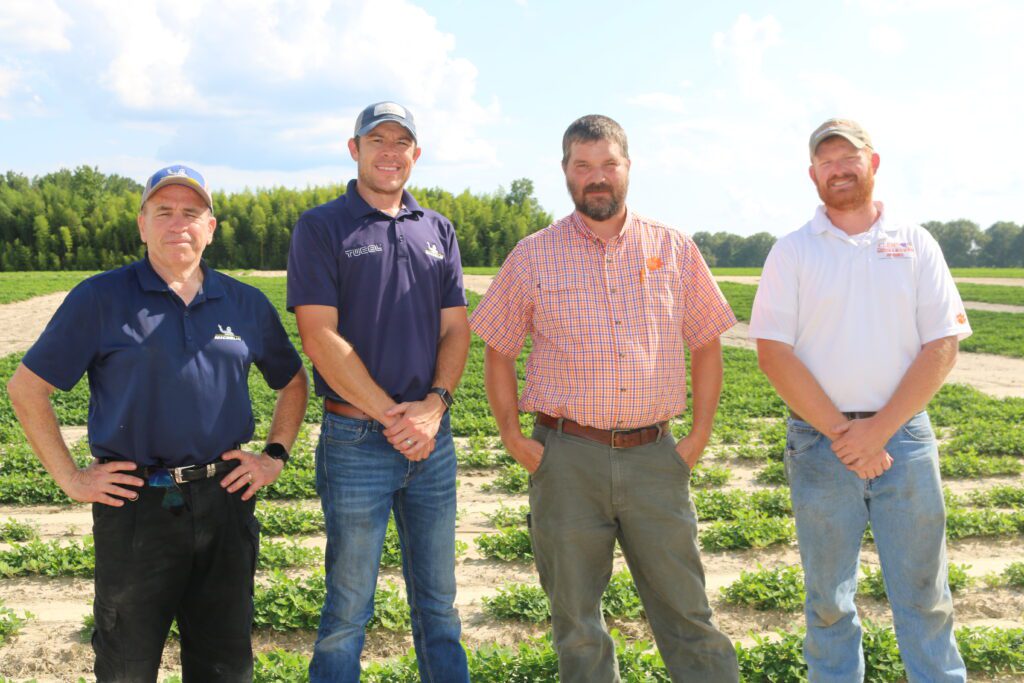
We know the researchers at Clemson University will make every effort to determine what data and information is going to best serve our regional farmers. Their proven track record and history in the agricultural world make Clemson one of the academic leaders in this type of real-world research.
Martin Crouch, agriculture account executive, Michelin Agriculture
Soil compaction is a major problem that affects plant growth and development, resulting in yield losses of up to 50% on some localized, high-traffic areas of South Carolina farms, such as end-rows.
Some Clemson University and Michelin North America, Inc. researchers believe low-pressure tires can reduce soil compaction to help increase crop yields for South Carolina farmers.

Kendall Kirk, Clemson Cooperative Extension Service precision agriculture engineer and director of the Clemson University Center for Agricultural Technology (CU-CAT) and Dan Anco, Clemson Extension peanut specialist, are working with Martin Crouch, Michelin Agriculture account executive and Steve Rosen, Michelin Agriculture field engineer, to determine if low-pressure tires can help increase yields in cotton and peanut rotations.
“Cotton and peanuts are two of the major crops grown in South Carolina,” Kirk said. “The overall goal of this study is to learn whether there is an economic benefit to implementing low-pressure tire technologies in a cotton-peanut production system.”
Soil compaction is caused by continuous wheel or foot traffic that squeezes air from between soil particles causing the soil to become hard, resulting in a decrease of water reaching plants’ roots. Information from the National Institute for Food and Agriculture shows most sandy soils in South Carolina have a compacted zone known as a “hardpan” that roots can’t penetrate.
Hardpan is usually found at a depth of 10 to 16 inches and can be 2 to 8 inches thick. This prohibits roots from reaching water and nutrients found in deeper soil. A Clemson study shows hardpan can reduce crop yields by as much as 50% and make plants more susceptible to drought stress.
Typically, compaction and effects of compaction are more prevalent on end-rows or turn-rows, where machines turn around at the end of a pass, but some degree of compaction occurs everywhere that ground traffic occurs in a field. A reduction in tire pressure reduces soil compaction because the tire footprint or flat plate area – the portion of the tire that touches the surface – increases as the tire is deflated. Because the weight supported by the tire is unchanged and the area over which it distributes this weight is increased, pressure exerted on the soil is reduced.
If you want to learn from the leader in cellphone technology, you go to Apple and if you want to learn from the leader in agriculture you go to Clemson.
Martin Crouch, agriculture account executive, Michelin Agriculture
For this study, researchers are looking at the effects of planting tractors and harvest machinery equipped with Michelin’s Ultraflex VF (Very High Flexion) tire technology on yield and related variables in different soil types. At 40 tons loaded, modern cotton pickers are among the heaviest field machines used in major row crop production. The Ultraflex technology is designed to operate at low pressures and adapt to changes in pressure without affecting tire structure.

“Clemson is conducting these tests in South Carolina, which will provide region-specific information for farmers,” Crouch said. “We know Clemson researchers will determine what information is best for the region’s farmers. Their proven track record and history in the agricultural world make Clemson one of the academic leaders in this type of real-world research.
“If you want to learn from the leader in cellphone technology, you go to Apple and if you want to learn from the leader in agriculture you go to Clemson.”
A similar study was conducted on wheat by researchers at Harper Adams University in the United Kingdom. Researchers found a 4% increase in yields when machinery equipped with Michelin Ultraflex (IF/VF) radial tires was used, as compared to machinery using standard radial tires. A 2015 study by researchers at the University of Illinois at Urbana-Champaign on corn and soybeans found a 4.3% yield gain using Michelin Ultraflex radial tires versus standard radial tires.
“If similar yield benefits are found in South Carolina cotton and peanut crops, revenue benefits could be as much as $30 to $45 per acre,” Kirk said.
Michelin Ultraflex radial tires are designed to operate at lower air pressures as compared to standard radial tires. This technology also can be coupled with a Central Tire Inflation System, or CTIS, which equipment operators use to control tire pressure from the cab, such as when changing between field and road travel.

“Operators can decrease tire pressure when they enter a field,” Rosen said. “Using lower tire pressure in fields increases the tire’s footprint to reduce ground pressures in the field, helping improve soil aeration, water infiltration and allowing for better root distribution.”
The CTIS is compatible with most agricultural machinery.
This first year of a three-year study is a “team effort,” Kirk said. In addition to Kirk and Anco, CU-CAT specialists, and the Michelin representatives, others helping with this research include trades specialists who work at the Edisto REC Tim Still and Kim Still, the South Carolina Peanut and Cotton boards and cooperating farmers.
“This project is unique in that it has buy-in and support from people in various sectors of agriculture,” Kirk said. “It is a model for the type of collaborations we seek to establish through Clemson’s Center for Agricultural Technology.”
For information about the Center or collaboration opportunities, contact Mallory Douglass, CU-CAT business manager, at mmdougl@clemson.edu or (708) 837-6256.
-END-

SC Public Radio interview with Mallory Douglass
about CU-CAT
Mike Switzer with South Carolina Public Radio interviews Mallory Douglass, Clemson University Center for Agricultural Technology (CU-CAT) manager, about how CU-CAT researchers work to develop, test and help implement new technologies for increasing productivity and decreasing costs in the agribusiness sector. (Highlight and right click, or copy and paste in browser, link below to access page with interview. After opening page, click blue Listen button to listen to interview.)
https://www.southcarolinapublicradio.org/show/south-carolina-business-review/2023-07-19/clemson-creating-lab-for-the-future-of-agribusiness?fbclid=IwAR0ybtNErfpW2Xx6qKxSSaRxxoaHWaN1VNeBN_IzwYIb1TKfNzNRx1eFRMM
Get in touch and we will connect you with the author or another expert.
Or email us at news@clemson.edu
